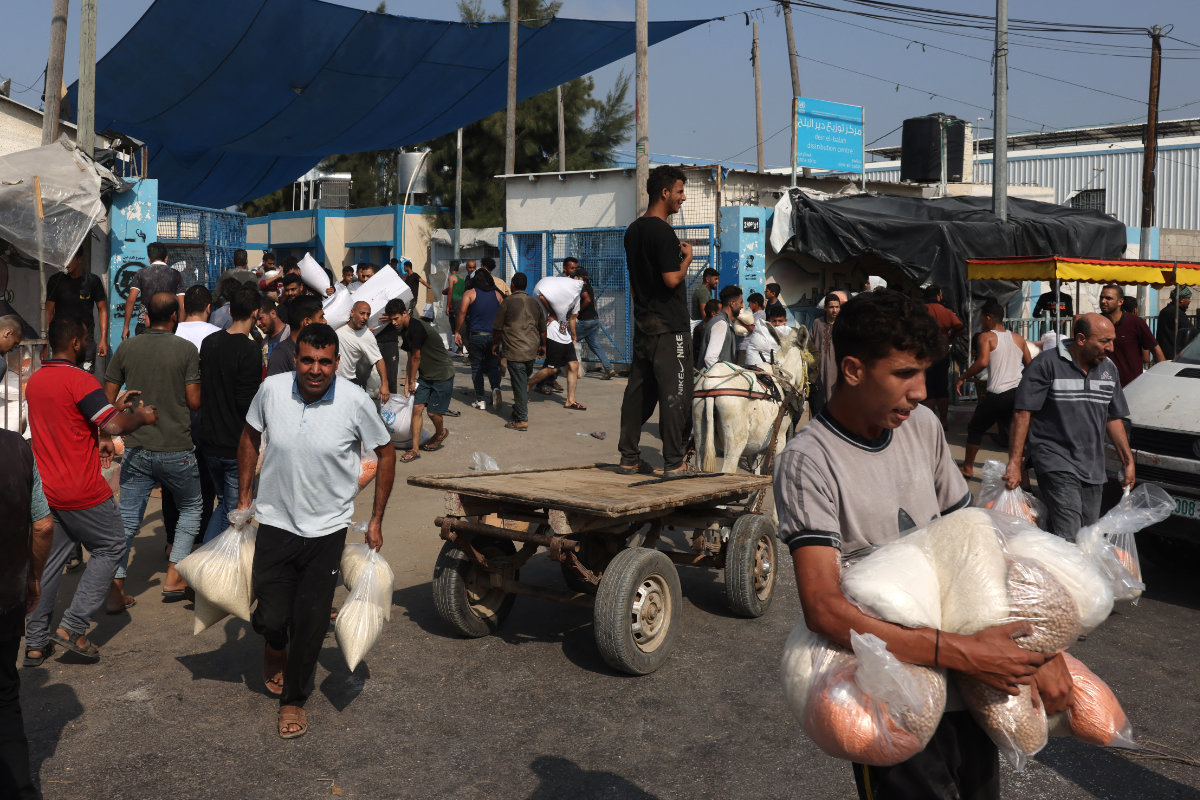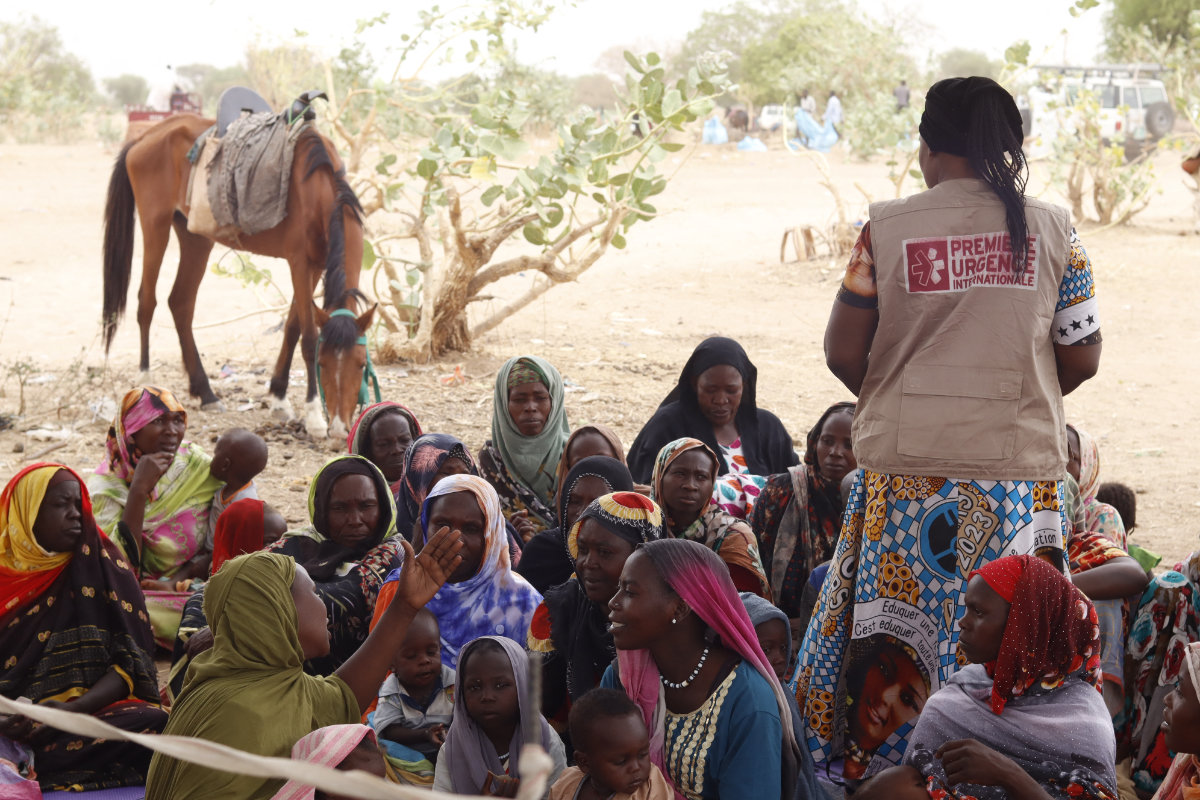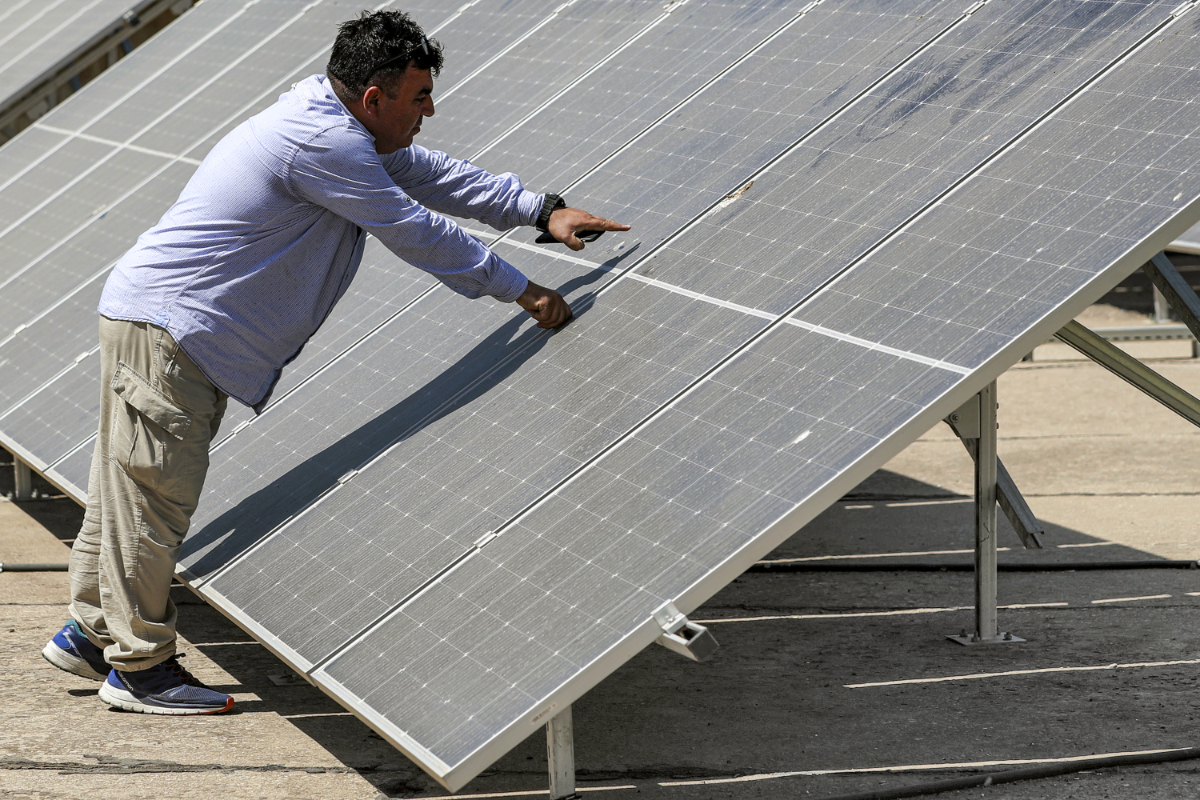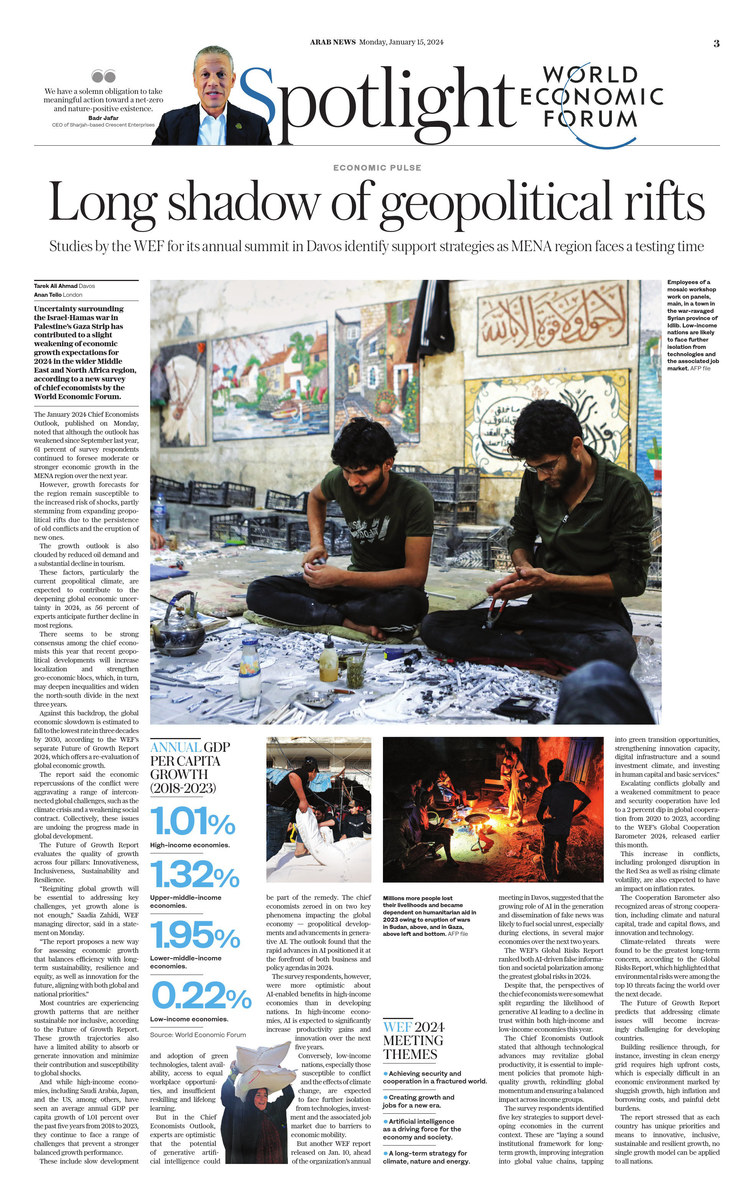DAVOS/LONDON: Uncertainty surrounding the Israel-Hamas war in Palestine’s Gaza Strip has contributed to a slight weakening of economic growth expectations for 2024 in the wider Middle East and North Africa region, according to a new survey of chief economists by the World Economic Forum.
The January 2024 Chief Economists Outlook, published on Monday, noted that although the outlook has weakened since September last year, 61 percent of survey respondents continued to foresee moderate or stronger economic growth in the MENA region over the next year.

Palestinians storm a UN-run aid supply center ion in Deir al-Balah on October 28, 2023, following Israel's call for more than one million residents in northern Gaza to move south for their safety, amid the ongoing battles between Israel and the Palestinian group Hamas. (AFP/File)
However, growth forecasts for the region remain susceptible to the increased risk of shocks, partly stemming from expanding geopolitical rifts due to the persistence of old conflicts and the eruption of new ones.
The growth outlook is also clouded by reduced oil demand and a substantial decline in tourism.
These factors, particularly the current geopolitical climate, are expected to contribute to the deepening global economic uncertainty in 2024, as 56 percent of experts anticipate further decline in most regions.

A aid worker from the humanitarian agency Premiere Urgence assists Sudanese refugees who crossed into Chad in Koufroun, near Echbara, on May 1, 2023. (AFP)/File)
There seems to be strong consensus among the chief economists this year that recent geopolitical developments will increase localization and strengthen geo-economic blocs, which, in turn, may deepen inequalities and widen the North-South divide in the next three years.
WEF 2024 MEETING THEMES
• Achieving security and cooperation in a fractured world.
• Creating growth and jobs for a new era.
• Artificial intelligence as a driving force for the economy and society.
• A long-term strategy for climate, nature and energy.
Against this backdrop, the WEF’s separate Future of Growth Report 2024 says the economic repercussions of the Middle East conflict are aggravating a range of interconnected global challenges, such as the climate crisis and a weakening social contract. Collectively, these issues are undoing the progress made in global development.
The Future of Growth Report evaluates the quality of growth across four pillars: Innovativeness, Inclusiveness, Sustainability and Resilience.
“Reigniting global growth will be essential to addressing key challenges, yet growth alone is not enough,” Saadia Zahidi, WEF managing director, said in a statement on Monday.

An Iraqi-Kurdish electrical engineer gives a briefing on solar energy in Sulaimaniyah in northern Iraq's autonomous Kurdish region on September 20, 2023. Despite its vast oil wealth, Iraq struggles to provide enough electricity to its 43 million people after decades of conflict and sanctions, as well as rampant corruption and crumbling infrastructure. (AFP/File)
“The report proposes a new way for assessing economic growth that balances efficiency with long-term sustainability, resilience and equity, as well as innovation for the future, aligning with both global and national priorities.”
In the Chief Economists Outlook, experts are optimistic that the potential of generative artificial intelligence could be part of the remedy.
The chief economists zeroed in on two key phenomena impacting the global economy — geopolitical developments and advancements in generative AI. The outlook found that the rapid advances in AI positioned it at the forefront of both business and policy agendas in 2024.
The survey respondents, however, were more optimistic about AI-enabled benefits in high-income economies than in developing nations. In high-income economies, AI is expected to significantly increase productivity gains and innovation over the next five years.

The Saudi Data and Artificial Intelligence Authority aims to raise awareness of the importance of generative artificial intelligence as it contributes to enhancing the building of a bright future for the Kingdom. (SDAIA illustration)
Conversely, low-income nations, especially those susceptible to conflict and the effects of climate change, are expected to face further isolation from technologies, investment and the associated job market due to barriers to economic mobility.
But another WEF report released on Jan. 10, ahead of the organization’s annual meeting in Davos, suggested that the growing role of AI in the generation and dissemination of fake news was likely to fuel social unrest, especially during elections, in several major economies over the next two years.
The WEF’s Global Risks Report ranked both AI-driven false information and societal polarization among the greatest global risks in 2024.
Despite that, the perspectives of the chief economists were somewhat split regarding the likelihood of generative AI leading to a decline in trust within both high-income and low-income economies this year.
ANNUAL GDP PER CAPITA GROWTH (2018-2023)
• 1.01% High-income economies.
• 1.32% Upper-middle-income economies.
• 1.95% Lower-middle-income economies.
• 0.22% Low-income economies.
Source: World Economic Forum
The Chief Economists Outlook stated that although technological advances may revitalize global productivity, it is essential to implement policies that promote high-quality growth, rekindling global momentum and ensuring a balanced impact across income groups.
The survey respondents identified five key strategies to support developing economies in the current context.
These are “laying a sound institutional framework for long-term growth, improving integration into global value chains, tapping into green transition opportunities, strengthening innovation capacity, digital infrastructure and a sound investment climate, and investing in human capital and basic services.”
Escalating conflicts globally and a weakened commitment to peace and security cooperation have led to a 2 percent dip in global cooperation from 2020 to 2023, according to the WEF’s Global Cooperation Barometer 2024, released earlier this month.

A Houthi military helicopter flies over the Galaxy Leader cargo ship in the Red Sea in this photo released November 20, 2023. Prolonged disruption of shipping across the Red Sea is expected to result in higher inflation globally. (Houthi handout via REUTERS/File Photo)
This increase in conflicts, including prolonged disruption in the Red Sea as well as rising climate volatility, are also expected to have an impact on inflation rates.
The Cooperation Barometer also recognized areas of strong cooperation, including climate and natural capital, trade and capital flows, and innovation and technology.
Climate-related threats were found to be the greatest long-term concern, according to the Global Risks Report, which highlighted that environmental risks were among the top 10 threats facing the world over the next decade.


















